Some of these books may not be available on Amazon. But not to worry, there are a number of alternative online booksellers. Below are some of the more popular ones. Condition and price vary widely, so shop wisely!
Theology
Dispensationalism
Christian Zionism
Judaism
Theology
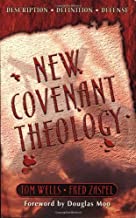
New Covenant Theology, by Tom Wells & Fred Zaspel.
In the main, this book expresses the theology embraced by Liberty Fellowship. The word of Jesus and the New Testament authors represent the final word on all things theological. The Old Testament is only properly interpreted, understood—and fulfilled—in the light of Jesus and the New Testament.
From the foreword.
“What a great time to be a biblical theologian! . . . . Covenant theologians are wondering whether some of their cherished doctrines have clear scriptural support. Many dispensationalists, under the name of ‘Progressive Dispensationalism’ are recasting their tradition. . . . . a return to careful analysis of our traditions in light of what the Bible teaches is certainly, on the whole, a welcome development.
“This book on New Covenant Theology by Tom Wells and Fred Zaspel is a fine representation of this new biblical theology tradition. While expressing deep appreciation for the heritage of Reformed theology, Wells and Zaspel nevertheless argue that the emphasis on the continuity of revelation in much of that tradition has been overdone. They are convinced that the New Testament claims an ultimacy for itself that is not always respected in Reformed, and especially Covenant, theology. Particularly is this the case when one considers the teaching in the New Testament about the Mosaic law. Wells and Zaspel therefore appropriately devote considerable space to this matter. Wells does a fine job of analyzing some of the historical and broadly theological issues, while Zaspel concentrates on a careful exegesis of key New Testament texts—especially the pivotal Matthew 5:17-20. The combination is impressive and persuasive.” – Dr. Douglas J. Moo, Ph.D. University of St. Andrews, Scotland and Blanchard Professor of New Testament at the Wheaton College Graduate School.
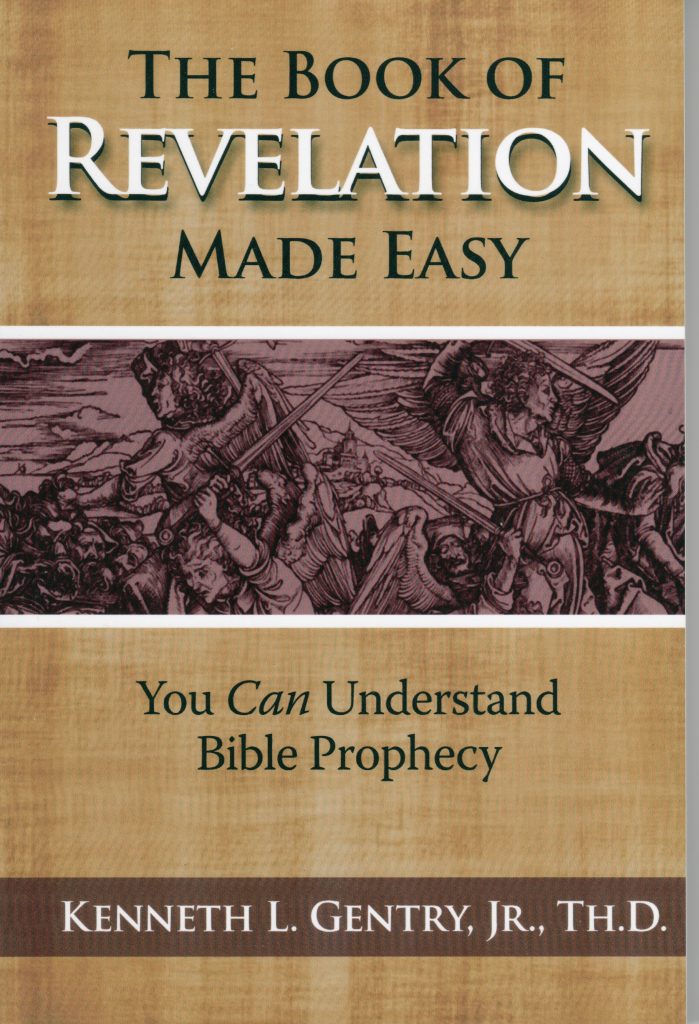
The Book of Revelation Made Easy, by Kenneth L. Gentry, Jr., Th.D.
Dr. Gentry does a beautiful job in addressing the major themes and characters in this otherwise mysterious book, demonstrating conclusively that it was foretelling first century events, culminating in the Destruction of Jerusalem and her Temple in 70AD. I have successfully taught through this book several times. It is indeed very easy to understand, and its points are both educational and compelling. You will never see the Book of Revelation in the same way again. In fact, you will never see the entire Bible in the same way again. And that’s a good thing! Available in our own Bookstore.
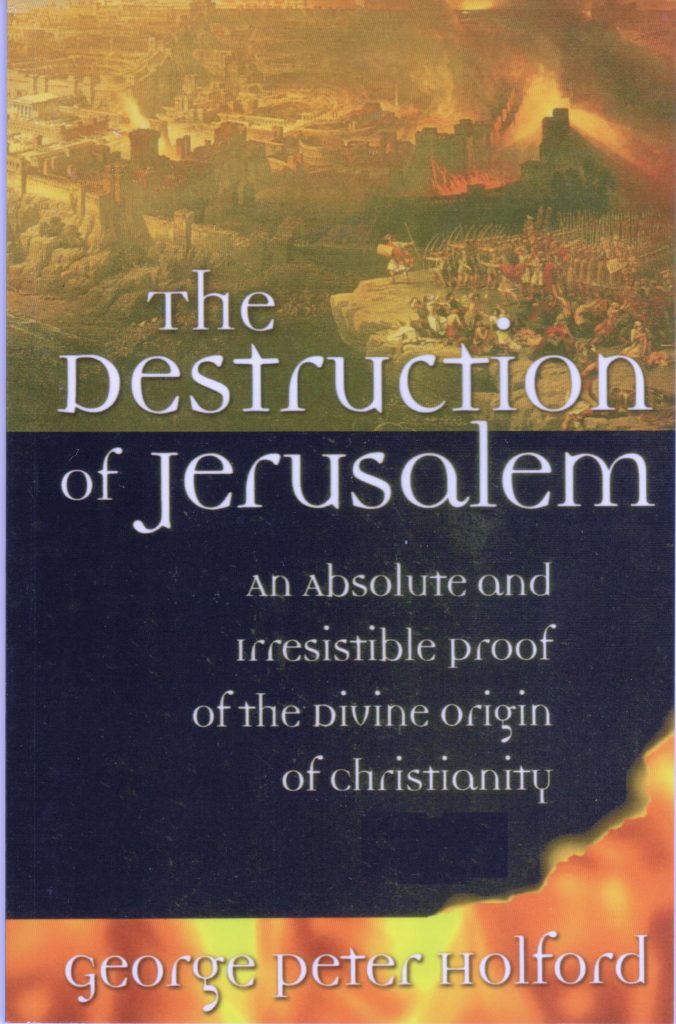
The Destruction of Jerusalem, by George Peter Holford. Reprint of the 1805 original.
A wonderful and timeless analysis of Jesus’ Olivet Discourse in Matthew 24, punctuated by a myriad of first century historical events which fulfilled this significant prophecy. Demonstrates conclusively that the Olivet Discourse was fulfilled in the run-up to the Destruction of Jerusalem and its Temple in 70 AD, which was the climax of its prediction. Available in our own Bookstore.
Dispensationalism
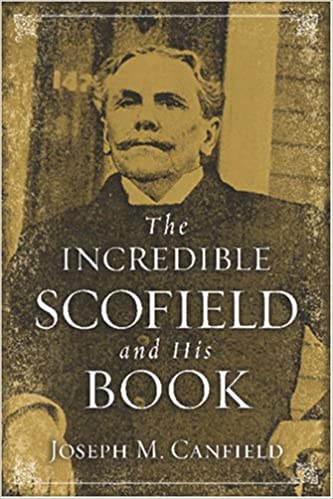
The Incredible Scofield and His Book, by Joseph M. Canfield.
This powerful and fully documented study exposes the questionable background and faulty theology of the man responsible for the popular Scofield Reference Bible, which did much to promote the dispensational system. The story is disturbing in its historical account of the illusive personality canonized as a dispensational saint and calls into question the seriousness of his motives and scholarship. From the Back of Book:
Almost everyone knows about the Scofield Bible. But no one before this has worked out a detailed account of the life of Cyrus I. Scofield. And yet there is such an amazing amount of material that should be known about this man that everyone who is at all interested in the dispensational system should read this book.
This is a powerful book. The material is well documented. Anyone who gets this book and reads it will find here some amazing things about a man whose book is well known, but whose life we believe concerning many of its most features has been purposely concealed lest it be found to contradict his teachings.
This is one of the most powerful books that has ever been written against the dispensational system. It is powerful because it shows how the book that has had the most to do with promotion of that system. The Scofield Reference Bible, originated.
Here is a book that dispensationalists as well as others will do well to read. It is powerful, so powerful we dare say, that if dispensationalists would read it carefully, perhaps half of them would turn from that system. — Loraine Boettner, Reformed Theologian
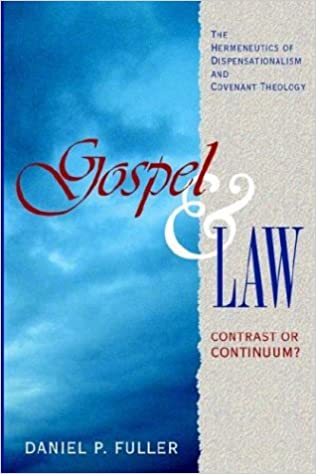
Gospel & Law: Contrast or Continuim?, by Daniel P. Fuller.
A detailed, technical examination of the theological and scriptural underpinnings of both Dispensational as well as Covenant Theologies.
From the back cover:
“Rejecting the sharp distinction drawn by Luther and Calvin between an Old Testament Covenant of Works and a New Testament Covenant of Grace, Fuller argues that the Mosaic law—no less than the gospel proclaimed by Jesus—required only the obedience of faith, and repudiated the idea that works merit divine blessing. Further, he sees in Christ the telos of the law, not in the sense of being its termination, but as climaxing it as the One who is in a continuum with it.”
Challenging both covenantal and dispensationalist positions, Fuller’s stimulating study reaffirms the Reformers’ emphasis on grace and faith, while underscoring anew the unity of the scriptures.
“This book was not born in haste and bears the marks of careful thought and expression. The argument is well-honed and calls for studied attention to every sentence. Even at the toughest points common speech and everyday analogies are preferred to theological jargon which so often conceals muddle-headedness . . . . Above all the book is the fruit and demonstration of detailed and sober exegesis which reflects Dr. Fuller’s sometimes misunderstood, yet incontrovertible commitment to the Bible as the infallible Word of God. It would be no accident therefore if Gospel and Law changed lives (as it has mine) as well as hermeneutical systems.” – John Piper, Bethel College and Seminary
Daniel P. Fuller, D.Theol., professor of hermeneutics at Fuller Seminary from 1953 to 1993, and one-time dean of the seminary, began his professional career as assistant to his father, Charles E. Fuller, on the “Old Fashioned Revival Hour” during the 1940s. After completing his master’s degree at Fuller, he earned his doctorate at the University of Basel in Switzerland. His popular writings include Give the Winds a Mighty Voice: The Life of Charles E. Fuller (1972) and The Unity of the Bible (1992).
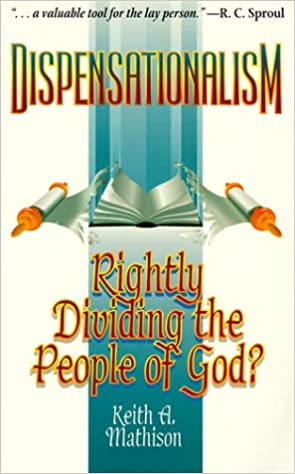
Dispensationalism: Rightly Dividing the People of God?, by Keith A. Mathison.
From the back cover:
Does God have two distinct plans for His people: “Plan A” for Israel, and “Plan B” for the Church?
Is the church age a mysterious “parenthesis,” unforeseen by Old Testament prophets?
Will believers be raptured out of the world prior to a period of great tribulation?
What do dispensationalists believe concerning the kingdom of God, the millennium, and the central doctrines of salvation?
And how do those views compare with Scripture and the historic teachings of the church?
“. . . a clear introduction to the essential issues that divide dispensational theology from the classical Reformed orthodoxy . . . a valuable tool for the lay person.” — R.C. Sproul
Keith A. Mathison (MA, Reformed Theological Seminary; PhD, Whitefield Theological Seminary) is dean of the Ligonier Academy of Biblical and Theological Studies and an associate editor of Tabletalk magazine at Ligonier Ministries. He is the author of Dispensationalism: Rightly Dividing the People of God?; Postmillennialism: An Eschatology of Hope; The Shape of Sola Scriptura; and Given for You: Reclaiming Calvin’s Doctrine of the Lord’s Supper. He is editor of When Shall These Things Be: A Reformed Response to Hyper-Preterism and associate editor of The Reformation Study Bible. He lives in Lake Mary, Florida, with his wife and children.
Christian Zionism

Christian Zionism, by Stephen Sizer. (Inter-Varsity Press, 2004)
From the back cover.
The term “Zionism” was first coined in the late nineteenth century, and referred to the movement for the return of the Jewish people to an assured and secure homeland in Palestine. Ironically, this vision was largely nurtured and shaped by Christians long before it received widespread Jewish support. The origins of “Christian Zionism” lie within nineteenth-century British premillennial sectarianism, but by the early twentieth century it had become a predominantly American dispensational movement, and pervasive within all main evangelical denominations. The contemporary Christian Zionism movement emerged after the “Six Day War” in Israel in 1967, and it has had a significant influence on attitudes towards the ongoing Palestinian-Israeli conflict in the Middle East.
Evangelicals are increasingly polarized over whether Christian Zionism is biblical and orthodox or unbiblical and cultic. In this book Stephen Sizer provides a thorough examination of the historical development, variant forms, theological emphases and political implications of Christian Zionism. His excellent and informative survey is interwoven with critical assessment that repudiates both nationalistic Zionism and anti-Semitism.
Stephen Sizer was ordained in the Anglican Church in 1983 and served as a curate in St Leonard’s on Sea, Sussex (1983-1986). He was appointed Curate-in-Charge, then Rector of St John’s, Stoke, Guildford in Surrey (1986-1997). He was appointed vicar of Virginia Water in 1997 where he served for 20 years until 2017. See his website at http://stephensizer.com
Judaism
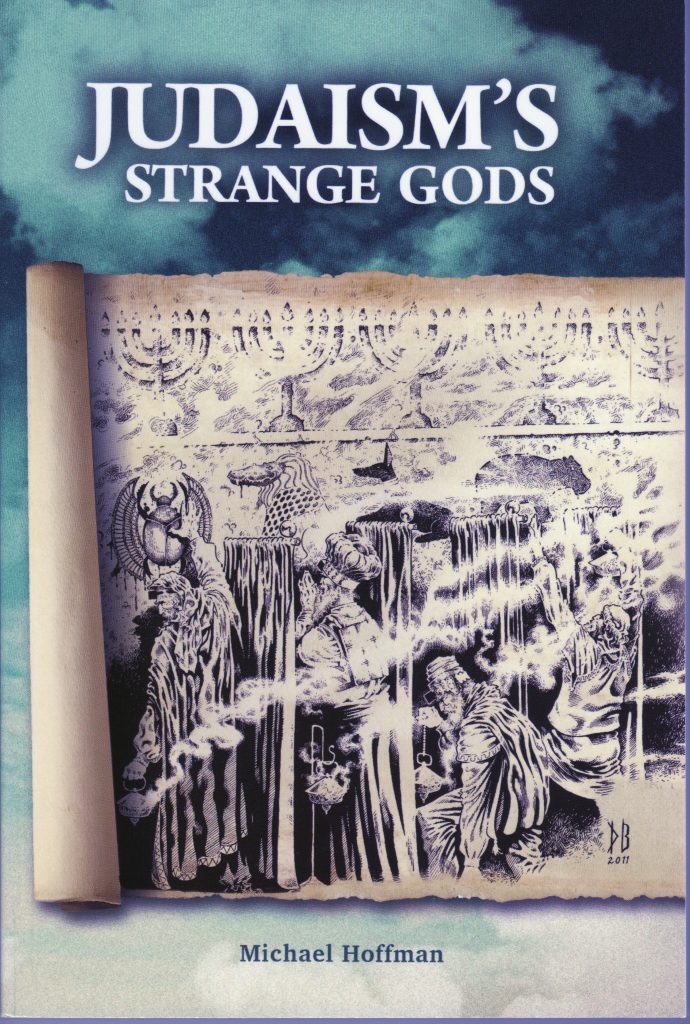
Judaism’s Strange Gods, by Michael Hoffman. Available in our own Bookstore.
This is a 400 page condensation of the author’s 1,100 page, more encyclopedic work Judaism Discovered. Here, scholar Michael Hoffman provides an accurate and much needed understanding of Judaism, both ancient and modern. The Church owes Michael Hoffman a debt of gratitude for his revealing, thorough and painstaking work. Thank you, Michael!
From the back cover:
“In Judaism’s Strange Gods, Christian scholar Michael Hoffman documents his provocative thesis that Judaism is not the religion of the Old Testament, but the newly formalized belief system of the Pharisees, which arose in Babylon with the commitment of the formerly oral ‘tradition of the elders’ to writing, in the wake of the crucifixion of Israel’s Messiah and the destruction of the Temple.
“Basing his findings on authoritative Judaic sources, Hoffman demonstrates that Judaism is a man-made religion of tradition and superstition, which represents the institutionalized nullification of Biblical law and doctrine.
“Liberating the reader from the accumulated shackles of decades of misinformation, this book shows that Judaism’s god is not the God of Israel, but the strange gods of Talmud and Kabbalah, and the racial self-worship they inculcate.
“Christian bookstores are packed with tomes purporting to unmask the religion of Islam, but not one slim volume will be found delving into the depravities of Orthodox Judaism. Judaism’s Strange Gods corrects that imbalance with its fidelity to Biblical truth and the historic witness to the Church.”
As you learn the truth about Orthodox Talmudic Judaism, with loving concern for the welfare and liberation of Judaic people and all people, please remember that the American Church is aggressively and blindly cheerleading this spiritual depravity, without any genuine understanding whatsoever. And in the process, they have unwittingly become a partaker of that sin.
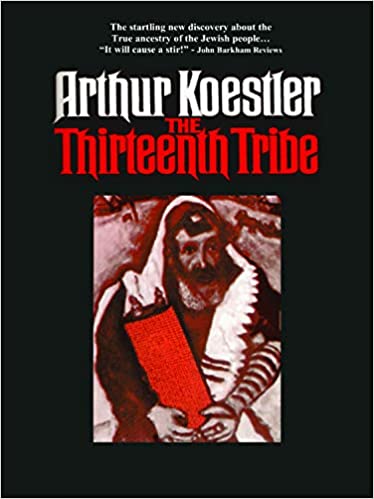
The Thirteenth Tribe, by Arthur Koestler. A modern classic. Koestler (an Ashkenazi Jew himself) chronicles the history of ancient Khazaria (7th – 11th centuries) and that Empire’s politically expedient adoption of Judaism in the 8th century. When their Empire came to an end in the 11th century, many of these Khazarian “Jews” migrated to Eastern Europe (Poland) where they “formed the cradle of European Jewry,” and became known as the “Ashkenazi” Jews of today’s world. And in 2012 a John Hopkins University genetic study of the world’s “Jewish” populations indeed verifies that well over 90% of today’s “Jews” are in fact Khazarian, with no genetic material from Abraham whatsoever. And in Eretz Israel (the Modern State of Israel) that Khazarian percentage climbs to 97.5%.
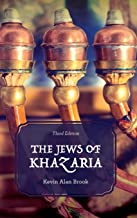
The Jews of Khazaria (Third Edition), by Kevin Alan Brook.
From the back cover.
The Jews of Khazaria explores the history and culture of Khazaria—a large empire in eastern Europe (located in present-day Ukraine and Russia) in the early Middle Ages noted for its adoption of the Jewish religion. The third edition of this modern classic features new and updated material throughout, including new archaeological findings, new genetic evidence, and new information about the migration of the Khazars.
Though little-known today, Khazaria was one of the largest political formations of its time—an economic and cultural power connected to several important trade routes and known for its religious tolerance. After the royal family converted to Judaism in the ninth century, many nobles and common people did likewise. The Khazars were ruled by a succession of Jewish kings and adopted many hallmarks of Jewish civilization, including study of the Torah and Talmud, Hebrew script, and the observance of Jewish holidays. The third edition of The Jews of Khazaria tells the compelling true story of this kingdom past.